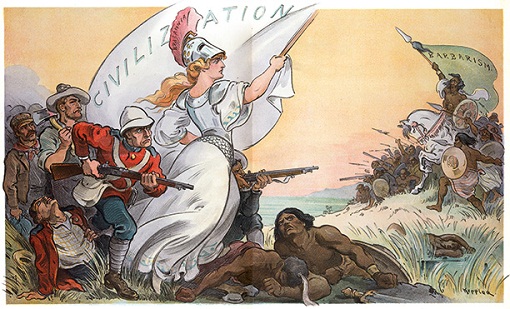Following his posts on our geography and sporting pastimes, David Cohen continues his (very) occasional series giving a US perspective of the British with a succinct summary of our history…
The history of England is the history of colonialism, mostly with the English on the sharp side of the spear. Being English they of course berate themselves for their vicious colonialism. As we’ve shown, one of the defining characteristics of Englishness is to take the most aggrandizing view of any bad situation, and then find some reason to berate themselves.
England has been colonialized by Rome, Saxon tribes, Vikings, the Scots, Rome again, the French, the Scots, the Dutch, the Germans, the Scots, and is now ruled by an unwieldy but continent wide German/ French collective (and not, to echo a famous English joke, a collective where the French cook and the Germans engineer). This last is particularly beloved by the English, who – just after finding the downside of success – most enjoy a widespread misery (see, e.g., the NHS).
For a short period of time, England colonized North America and India. It feels terribly guilty about India, but under the Treaty of Paris all guilt over colonizing North America devolved to the United States. For a much longer period of time, England colonized Ireland. This is the one instance in which the English as colonial masters ever reached the depths achieved by King Leopold on his best day but oddly they feel no guilt about this whatsoever.
England was discovered by Julius Caesar, who came, founded Londinium (Latin for “Let’s build some baths and a random wall or two that people won’t stop running on and on about for 2000 years”), and promptly ran off to Egypt. One suspects that the climate had more to do with this than Cleopatra. Rome stuck it out for a couple of centuries and then realized that there’s no helping some people. After Rome left, no one much bothered with England for nearly a millennium, other than some Vikings and a small number of Germanic tribes, who soon overran the place
The Saxons were superseded by the French, who more or less invented England as we now know it. The English ultimately beat the French, as they did the Saxons, by having pretty daughters. The English now basically consider themselves to be the old French of 1066 and scorn the new French (for the same reasons, oddly enough, that their forefathers scorned the old French. There is, nonetheless, something of a culture war still being fought between the old English and the old French. The English call it class and seem to be winning.
Somewhere in here, the Roman Catholic Church took over, but soon found that it couldn’t stomach Henry VIII. England sympathized.
The Scots next ran England for a couple of generations. This was, it is widely conceded, the height of English civilization, giving birth to both the King James Bible and Shakespeare. In gratitude, the English only beheaded the Scottish king rather than, as was traditional, pulling him apart into little pieces.
For the next 11 years, the English ruled themselves. This was generally considered a disaster and the Scots were asked back. The English decided that they rather liked being ruled by foreigners, they just didn’t like the foreigners to get too comfortable. They threw over the Scots for the Dutch and then the Dutch for the Germans. The Germans were so convinced that they would, in turn, be given the heave-ho that they didn’t bother to learn English for a couple of generations. Then they got around the whole problem by having every royal in Europe birthed by Queen Victoria. Since switching wouldn’t have made much of a difference, the English have mostly decided to stick with the German’s they have.
That brings us up to the 20th Century. It has been argued that the US has been the colonial power for much of the 20th century, with England the target of both cultural and military imperialism. There is obviously nothing to this, as is amply demonstrated by the fact that the English feel guilty about it. The Scots have ruled England for much of the late 20th and early 21st century through the backdoor plan of being the only reason the Labour Party has ever held power in Westminster. Colonialism is hard, however, and the Scots will soon vote on giving up their colonial power. Expect the English to feel guilty about that.
Next time: The National Health Service, about which the English feel not at all guilty.












Personally I am waiting for the day that we commence full scale nuclear war with spain over Gibraltar. Then after that we can vaporize Argentina
Ah, Gibraltar and the Falklands. Perfect examples of how he British misunderstand their own history seemingly for the purpose of feeling guilty about it. Colonialists should feel bad about people, not real estate. There’s no point feeling bad for Spain or Argentina because you took their rocks away from them.
To be fair, outside of the Guardian’s op-ed writers there aren’t very many Britons who feel guilty about the Falklands. Except for Morrissey, of course.
Baby steps, worm. You can’t expect to overcome all that guilt in one apocalyptic moment. Why don’t you start by re-taking Calais and see how it feels?
I also read this most timely article today:
https://medium.com/having-it-some/577da51fba72
A correction:
Obviously, “not a collective where the French cook and the Germans engineer.”
All this talk of colonialism reminds me of an entertaining xkcd article:
http://what-if.xkcd.com/48/
Apparently, the sun has yet to set on the British Empire (about which I feel terribly guilty.)